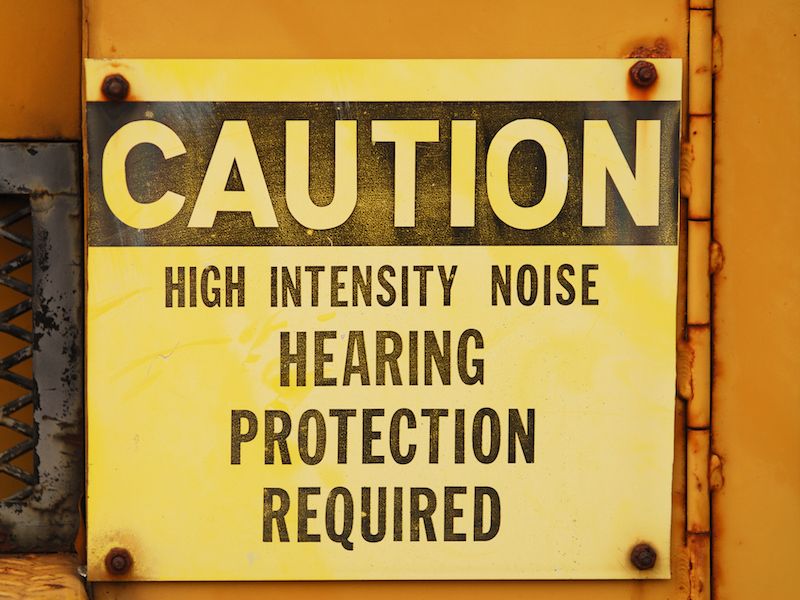
Knowing you should protect your hearing is one thing. It’s another matter to know when to safeguard your hearing. It’s not as simple as, for example, recognizing when to wear sunscreen. (Is it sunny and will you be outside? Then you need sunscreen.) Even knowing when you need eye protection is easier (Working with dangerous chemicals? Doing some building? You need eye protection).
It can feel as though there’s a significant grey area when addressing when to use hearing protection, and that can be dangerous. Unless we have specific knowledge that some place or activity is dangerous we tend to take the easy path which is to avoid the issue entirely.
Assessing The Risks
In general, we’re not very good at assessing risk, especially when it comes to something as intangible as permanent hearing damage or hearing loss. To demonstrate the situation, here are some examples:
- A very loud rock concert is attended by person A. 3 hours is approximately how long the concert lasts.
- Person B has a landscaping business. After mowing lawns all day, she goes home and quietly reads a book.
- Person C works in an office.
You might believe the hearing danger is higher for person A (let’s just call her Ann). Ann leaves the concert with her ears ringing, and she’ll spend the majority of the next day, struggling to hear herself talk. Presuming Ann’s activity was dangerous to her hearing would be sensible.
The noise that person B (let’s just call her Betty), is exposed to is not as loud. There’s no ringing in her ears. So it must be less hazardous for her hearing, right? Not necessarily. Because Betty is mowing every day. In reality, the damage accumulates a little at a time despite the fact that they don’t ring out. Even moderate noise, if experienced with enough frequency, can harm your ears.
What’s occurring with person C (let’s call her Chris) is even harder to make sense of. The majority of people understand that you need to protect your hearing while using machines such as a lawnmower. But even though Chris works in a quiet office, she has a very noisy, hour-long commute each day on the train. What’s more, she sits behind her desk and listens to music through earbuds. Is protection something she should consider?
When You Should Think About Protecting Your Hearing
Generally speaking, you should turn down the volume if you have to shout to be heard. And you really should think about wearing earplugs or earmuffs if your environment is that noisy.
The limit needs to be 85dB if you want to get scientific. Noises above 85dB have the ability, over time, to lead to damage, so in those scenarios, you should consider using hearing protection.
Most hearing professionals advise making use of a specialized app to keep track of decibel levels so you will be aware when the 85dB has been reached. You will be able to take the correct steps to safeguard your ears because these apps will tell you when the noise is getting to a dangerous level.
A Few Examples
Even if you do get that app and take it with you, your phone may not be with you wherever you go. So we might establish a good baseline with a couple of examples of when to protect our ears. Here we go:
- Listening to music with earbuds. OK, this doesn’t call for protection but does require caution. Whether your music is playing directly into your ears, how loud it’s playing, and how long you’re listening to it are all things you should give consideration to. Think about using headphones that cancel out outside sound so you don’t need to crank up the volume to dangerous levels.
- Operating Power Tools: You recognize you will need hearing protection if you work every day in a factory. But how about the hobbyist building in his garage? Even if it’s only a hobby, hearing specialists suggest using hearing protection if you’re utilizing power equipment.
- Exercise: You know your morning cycling class? Or maybe your daily elliptical session. Each of these cases could call for hearing protection. The loud volume from trainers who play loud music and microphones for motivation, though it may be good for your heart rate, can be bad for your hearing.
- Driving & Commuting: Driving all day as an Uber or Lyft driver? Or perhaps you’re just hanging around downtown for work or boarding the subway. The constant noise of city living, when experienced for between 6 and 8 hours a day, can cause injury to your hearing over the long haul, particularly if you’re cranking up your music to hear it over the din.
- Residential Chores: We already mentioned how something as basic as mowing the lawn, when done frequently, can necessitate hearing protection. Chores, like mowing, are most likely something you don’t even think about, but they can lead to hearing impairment.
A strong baseline may be researched by these examples. When in doubt, though, you should choose protection. Instead of leaving your ears exposed to future injury, in most situations, it’s better to protect your hearing. Protect today, hear tomorrow.